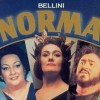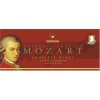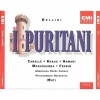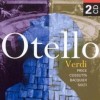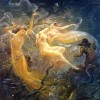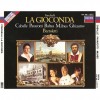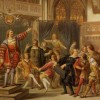歌剧剧本
Don Pasquale is an opera buffa, or comic opera, in three acts by Gaetano Donizetti. The composer Giovanni Ruffini wrote the Italian libretto after Angelo Anelli's libretto for Stefano Pavesi's Ser Marcantonio (1810).
At the time of its composition, Donizetti had just been appointed music director and composer for the imperial court of Emperor Ferdinand I of Austria, and Don Pasquale was the 64th of an eventual 66 operas he composed.
The opera, in the tradition of opera buffa, harks back to the stock characters of the commedia dell'arte. Pasquale is recognizable as the blustery Pantalone, Ernesto as the lovesick Pierrot, Malatesta as the scheming Scapino, and Norina as a wily Columbina. The false Notary echos a long line of false officials as operatic devices.
Performance history
Don Pasquale was first produced on 3 January 1843 at the Théâtre Italien in Paris.
Other performances during the 19th Century include those at La Scala, Milan on 17 April 1843], the first performance in Italy. In London it was presented for the first time in England on 29 June 1843 at Her Majesty's Theatre while the [United States]] premiere took place in New York on 9 March 1846. In Sydney on 12 October 1854 at the Royal Victoria Theatre the first Australian performance was presented.
While not a part of the "standard repertory, Don Pasquale apppears with some regualrity on the schedules of world opera houses
Synopsis
Place: Rome
All the events of the opera take place in a single day. The young man Ernesto is in love with the lovely but penniless Norina and has refused to marry a "more suitable" woman chosen for him by his rich uncle Don Pasquale. The old man accordingly plans to wed and produce his own heirs, cutting Ernesto off from his inheritance. Pasquale's physician, Dr. Malatesta, suggests his sister, Sofronia, a convent girl, as the bride, all the while scheming to dupe the old man into allowing Ernesto's marriage to Norina. The Don happily accepts the proposal. Malatesta has Norina disguise herself as Sofronia and sign a fake marriage contract before a false notary. At this point Norina transforms from the shy convent girl into a complete shrew, turning Pasquale's life upside down, hiring hordes of new servants and spending money left and right. She makes life so miserable for the old man that he is actually relieved when he discovers that he has been duped, and that he has not really married Norina. He repudiates his desire for marriage and consents to the union of his nephew with Norina.
Act 1
Introduction between Don Pasquale and the doctor. (Romance of Malatesta: “Oh, like an angel of beauty”; Cavatina, Pasquale: “Oh, how I feel the glow of fire in my heart”; Duet between Ernesto and Pasquale: “How? You will? Marry me.”) Change of scene: Norina’s cavatina: “Ah, beneath all eyes”; Duet between Norina and the doctor: “See, I am ready with love to surround him.”
Act 2
Ernesto alone; then Pasquale, Norina, doctor. (Terzett: “Take courage”; Finale: “On one side,” etc.)
Act 3
Chorus: “Bring the jewels at once”; Duet between Pasquale and Norina: “Dear wife, may I ask”; Duet between Pasquale and the doctor: “Softly in the dark.” Change of scene: Ernesto’s serenade: “As Luna laughs in the fragrant night”; Duet between Ernesto and Norina “Do I read in your looks ?“ Finale: “Heaven, what do you say? This is Norina.”






